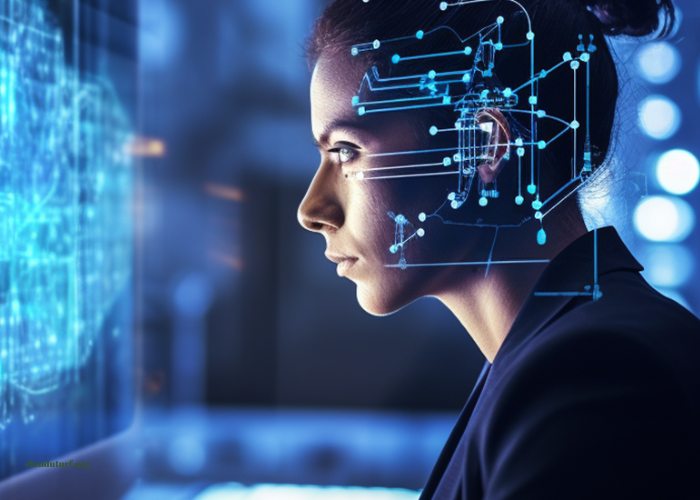Artificial intelligence (AI) is no longer just a futuristic concept—it’s a present-day reality transforming industries worldwide. With rapid advancements in machine learning, neural networks, and natural language processing, AI is becoming an integral tool in businesses, unlocking unprecedented levels of efficiency and driving innovation. From automation of routine tasks to creating new business models, AI is reshaping the landscape of the modern business world. In this article, we will explore how AI is revolutionizing efficiency and innovation in various sectors, the challenges it poses, and what the future holds for AI in business.
The Evolution of AI in Business
AI has evolved from a niche research topic to a mainstream business tool in just a few decades. Initially, AI was associated primarily with academic research and high-tech labs, focusing on theoretical models and experimental algorithms. However, the advent of big data, the exponential increase in computational power, and the rise of cloud computing have made AI accessible to businesses of all sizes.
Today, AI is embedded in numerous applications used by businesses, from recommendation engines on e-commerce platforms to chatbots providing customer service. The shift from rule-based systems to more sophisticated AI models, capable of learning from data and improving over time, has been crucial in enabling businesses to harness AI for real-world applications. This transition has also catalyzed innovations in how businesses operate, making processes faster, smarter, and more cost-effective.
Enhancing Efficiency with AI
One of the most significant ways AI is revolutionizing business is by enhancing efficiency across various functions. Businesses are always looking for ways to optimize operations, reduce costs, and improve productivity, and AI offers solutions in several areas.
Automation of Routine Tasks
AI-driven automation is transforming how businesses manage repetitive and time-consuming tasks. Robotic process automation (RPA) enables companies to automate routine tasks such as data entry, invoice processing, and customer support. Unlike traditional automation systems that rely on predefined workflows, AI-powered automation can learn from experience, adapt to changes, and handle more complex tasks.
For instance, in the finance sector, AI-driven systems can automatically process transactions, detect fraud, and manage compliance tasks. Similarly, in human resources, AI can streamline the recruitment process by screening resumes, scheduling interviews, and even conducting preliminary assessments through AI-based interview bots. This allows employees to focus on higher-value tasks that require creativity and problem-solving, thereby increasing overall productivity.
Supply Chain Optimization
AI is also playing a crucial role in optimizing supply chains. Machine learning algorithms can analyze vast amounts of data to predict demand, optimize inventory management, and improve logistics. This level of predictive analytics allows businesses to respond to market fluctuations more effectively and reduce the risk of overstocking or stockouts.
For example, retail giant Amazon uses AI to manage its supply chain operations. AI models forecast demand, optimize warehouse operations, and manage delivery routes, allowing the company to meet customer expectations of fast and reliable delivery. This has given Amazon a competitive edge in the e-commerce industry, where supply chain efficiency is paramount.
Predictive Maintenance in Manufacturing
In manufacturing, AI is revolutionizing equipment maintenance through predictive maintenance. Traditionally, maintenance schedules were either reactive (fixing equipment after it breaks) or preventive (servicing equipment at regular intervals, regardless of actual wear and tear). Predictive maintenance uses AI algorithms to monitor machinery in real-time, identify patterns, and predict when equipment is likely to fail. This approach reduces downtime, extends the lifespan of machinery, and saves costs associated with unexpected breakdowns.
For example, companies like General Electric (GE) have integrated AI into their industrial operations. GE uses AI-powered analytics to predict when turbines, engines, and other machinery need maintenance, improving operational efficiency and reducing maintenance costs.
Customer Service and Support
AI-powered chatbots and virtual assistants are increasingly used in customer service, providing instant support to customers and resolving common issues without the need for human intervention. These AI systems can handle multiple queries simultaneously, 24/7, offering faster response times and improving customer satisfaction.
AI in customer support is not limited to chatbots; it also includes sentiment analysis, where AI algorithms analyze customer interactions and feedback to gauge customer satisfaction and detect potential issues. Companies can use this data to improve their products and services, leading to better customer experiences.
AI-Driven Innovation in Business
Beyond efficiency, AI is a powerful driver of innovation, enabling businesses to create new products, services, and business models. AI’s ability to process and analyze massive amounts of data, make predictions, and provide insights is opening new avenues for innovation across industries.
Personalized Customer Experiences
AI is transforming the way businesses engage with customers by enabling highly personalized experiences. E-commerce platforms, for instance, use AI to analyze user behavior, preferences, and purchase history to provide personalized product recommendations. This not only enhances the customer experience but also increases sales by offering products and services that are more relevant to the customer.
Streaming services like Netflix and Spotify are prime examples of how AI is driving innovation in content personalization. By analyzing user data, these platforms can predict what content users are likely to enjoy and make personalized recommendations, which keeps users engaged and reduces churn.
Product Innovation
AI is also fostering innovation in product development. By analyzing market trends, consumer preferences, and data from various sources, AI can help businesses identify opportunities for new products and services. Moreover, AI can accelerate the design and development process by optimizing prototypes and simulations.
In the automotive industry, companies like Tesla are leveraging AI to innovate in self-driving technology. AI-powered systems enable vehicles to navigate roads, recognize obstacles, and make real-time decisions. This is not only transforming the automotive industry but also creating new business models around autonomous transportation.
AI in Marketing and Sales
In marketing, AI is enabling more targeted and effective campaigns. By analyzing customer data, AI systems can segment audiences, predict buying behaviors, and optimize advertising strategies in real time. This allows businesses to deliver the right message to the right audience at the right time, increasing the likelihood of conversion.
AI is also transforming sales by providing sales teams with predictive analytics that can identify high-potential leads and suggest the best strategies to convert them. Sales teams can use AI-powered tools to analyze customer data, monitor engagement, and refine their approaches based on insights generated by AI algorithms.
AI-Driven Business Models
AI is enabling the creation of entirely new business models. For instance, the rise of AI-as-a-Service (AIaaS) platforms allows businesses to access advanced AI capabilities without investing in expensive infrastructure. Companies can leverage cloud-based AI services for tasks such as data analysis, machine learning, and natural language processing, enabling them to innovate without significant upfront costs.
Moreover, AI is driving innovation in sectors like healthcare, where companies are using AI to develop new diagnostic tools, treatment plans, and personalized medicine. AI’s ability to analyze vast amounts of medical data is helping researchers discover new insights and develop innovative solutions to complex healthcare challenges.
Challenges and Ethical Considerations
While AI offers tremendous benefits, it also presents several challenges and ethical considerations that businesses must address.
Data Privacy and Security
AI relies heavily on data, and businesses must ensure that they handle this data responsibly. Data privacy concerns are paramount, especially with the increasing use of AI in customer-facing applications. Companies must comply with data protection regulations such as the General Data Protection Regulation (GDPR) and ensure that customer data is collected, stored, and used securely.
Moreover, AI systems can be vulnerable to cyberattacks, where malicious actors may attempt to manipulate the data or algorithms used by AI models. Businesses must invest in robust cybersecurity measures to protect their AI systems from such threats.
Bias in AI Algorithms
AI algorithms can sometimes inherit biases from the data they are trained on. If the training data reflects biases related to race, gender, or other factors, AI systems may produce biased outcomes. This is particularly concerning in areas like hiring, lending, and law enforcement, where biased AI decisions can have significant societal impacts.
To address this, businesses must ensure that their AI models are trained on diverse and representative data sets and that they regularly audit their algorithms to detect and mitigate bias. Ethical AI development requires transparency, accountability, and a commitment to fairness.
Job Displacement and Workforce Adaptation
The widespread adoption of AI is expected to disrupt the job market, as automation takes over routine tasks traditionally performed by humans. While AI can create new opportunities in areas such as AI development, data science, and AI-based services, it also raises concerns about job displacement, particularly in industries heavily reliant on manual labor or repetitive tasks.
Businesses must prepare for this shift by investing in reskilling and upskilling programs for their employees. Workers will need to adapt to new roles that require a blend of technical skills and creativity, while businesses should foster a culture of continuous learning to ensure their workforce remains competitive in an AI-driven economy.
The Future of AI in Business
The future of AI in business is incredibly promising. As AI technologies continue to evolve, they will become more sophisticated, capable of handling even more complex tasks and driving greater levels of innovation. Some key trends we can expect in the future include:
- AI-Powered Decision Making: AI will increasingly be used to support decision-making processes at all levels of business. From strategic planning to operational decisions, AI will provide businesses with data-driven insights and recommendations that enhance decision-making.
- AI in Human-AI Collaboration: Rather than replacing humans, AI will work alongside employees, augmenting their capabilities. This human-AI collaboration will allow businesses to leverage the strengths of both AI and human intelligence, leading to better outcomes.
- Ethical AI Practices: As AI becomes more pervasive, businesses will need to prioritize ethical AI practices. This includes ensuring transparency, fairness, and accountability in AI decision-making processes, as well as addressing issues like bias, data privacy, and the environmental impact of AI







